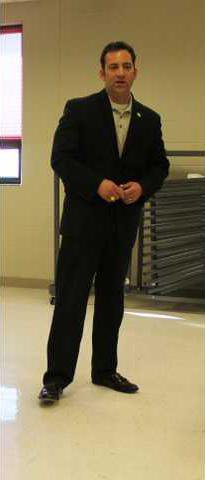Frustration over bills that seemingly target western and rural Kansas unfairly was evident from some of the questions asked by attendees at the Hoisington Legislative Coffee Saturday. Hoisington School Board President Dean Stoskopf. and Superintendent Bill Lowry were vocal on a bill that would limit a district’s ability to raise funds for capital improvements and one that sought to consolidate small school districts, as well as the ongoing legal battles to define the Gannon decision on school funding. Hoisington City Council member Brian Wilborn also questioned the logic of the state legislature’s decisions to seek passages of some bills, while the biggest problems of school funding and the state’s budget see little progress.
Rep. Troy Waymaster responded by way of sharing what some of the issues representatives find themselves up against as they represent their constituents and fight for the causes that are important to them.
First, he pointed out the fact that the state session is only open for 90 days, but this only reinforced Wilborn’s argument.
“You know you have a shorter time,” he said. “We know that school is the 800 lb gorilla in the room. So drop everything else and fix it.”
Waymaster then explained why it’s not that simple.
“Anybody can introduce a bill. Basically, a bill is just a person’s idea,” Waymaster said. “ Anybody can introduce any idea in bill format that they want to, whether it has constitutional muster or not. It’s just their idea.
It’s the House or the Senate leadership that decides which committee those bills go to. And, it’s the chairpersons of those committees, selected by the leadership, that determine which bills get heard and passed out of the committee. It is at the discretion of the chairman, and some bills may never see the light of day. The leadership focuses on the bills that are important to them, he explained.
“Just because there might be a logical bill out there, it has to go through the process,” he said. “It might be the best solution, but unless we get someone sitting in the chairman’s seat that believes in that, it’s not going to see any type of hearing or work passed out of committee.”
Relationships key
Building relationships is the key to getting over these hurdles, he said. While there are a number of legislators from urban and eastern districts who fail to understand the impacts of their bills on rural and western parts of the state, there are those who have an open mind and are willing to consider what they can do to help.
He spoke at length about the consolidation bill, which he said was indeed targeting western and rural districts. Introduced by a representative from Leavenworth and favored by many eastern and urban representatives, their main initiative with that was to drive down costs of administration. In those districts, school administration is run like a Fortune 500 company, he explained. To those in favor of it, he’s asked them to come visit his district, where shared responsibilities are the rule. He held up the example of the Natoma USD 399, where Aaron Homburg is a superintendent, a principal, fills in as a teacher, also a coach, and last year filled in at a school play because a student got sick.
“Show me a superintendent in Johnson County that would do that,” he said. “You wouldn’t find one.”
Winding down towards recess
For now, the odds are stacked against representatives like himself and Rep. John Edmonds, who was also fielding similar questions at the event.
As far as the state’s budgetary problems, Edmonds shared his conviction that the state will find one-time-only funding to balance the budget this year and then “kick the can down the road until next year.” He added that it will likely continue this way until the next Gubernatorial election in 2018. At that point, those who are elected into office will no longer have the burden of a legacy as the current governor does, and the chances of real change occurring go up.
Both Waymaster and Edmonds returned to Topeka this week for the final week before recess. Both the Senate and the House introduced bills to address the equity portion of the Gannon ruling Tuesday, and are expected to continue work on the bills all day Wednesday, with the goal of having something that can be presented to the Kansas Supreme Court before its June 30 deadline. A vote could be taken Wednesday afternoon.
According to the Lawrence World-Journal, the bills are considered likely to satisfy the courts because they contain formulas that have held up in the past. Most districts would receive more aid for capital outlay but substantially less for local option budgets. The formula would be in effect for only one year, and a more long-term solution would be advanced in 2017.
Lawmakers will adjourn on Thursday, and return later in April for a veto session.





